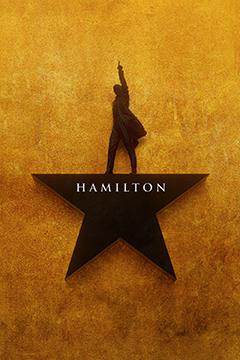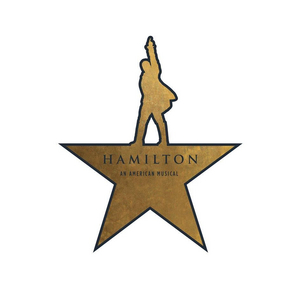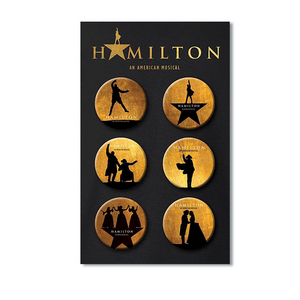10 Reasons Our Ten-Dollar Founding Father HAMILTON Is the Perfect Inspiration for a Hit Musical

|
|
HAMILTON, Lin-Manuel Miranda's new musical about American political figurehead Alexander Hamilton, opens on Broadway tonight. Countless stories on the jack-of-all-trades creator and his inspirations for the hit show have told us how Hamilton came about (nerdiest beach read ever), so now it's time to take a look at why. What is it about Hamilton that makes him a great dramatic subject?
It's in the history books. And in one epic tome in particular: Ron Chernow's ALEXANDER Hamilton biography.
Hamilton's life was so full of scandal and nuance that Miranda didn't have to weave fictitious tales to leave audiences enraptured. He, wanting historians to respect his work, merely drew from the life of a man who thought, wrote and lived beyond his time.
Scroll down for 10 reasons our ten-dollar Founding Father is the perfect inspiration for a hit musical!
1. His early life was nuts.
There's some debate over whether Hamilton was born in 1755 or 1757, but we know he was illegitimate and claims to have been delivered in riffraff-consumed Nevis, located in the British West Indies. He grew up in St. Croix, an island in the Caribbean, where the sugar trade flourished and slaves made up the majority of the population.
His mother, Rachel, had been previously married to and divorced from a spiteful plantation owner named Johann Michael Lavien before her affair with Alexander's father, Scottish trader James Hamilton, who left without a trace just before Rachel's death. The cousin who took in Rachel's sons (Alexander had an older brother) eventually committed suicide. Then their uncle, who was supposed to take charge of them after that, died.
There is even a question of whether James Hamilton is Alexander's father at all.
"Their short lives had been shadowed by a stupefying sequence of bankruptcies, marital separations, deaths, scandals, and disinheritance," Chernow writes in his biography. And all this before Alexander turned 15.
2. Everybody loves the underdog.
HAMILTON's story is a classic: that of "the obscure immigrant who comes to America, re-creates himself, and succeeds despite a lack of proper birth and breeding," says Chernow.
Lin-Manuel Miranda, speaking to The New York Times earlier this year, said, "...this is a guy who wrote his way out of his circumstances from the get-go. That is part and parcel with the hip-hop narrative: writing your way out of your circumstances, writing the future you want to see for yourself. This is a guy who wrote at 14, 'I wish there was a war.' It doesn't get more hip-hop than that."
It's so easy to root for a man trying to better himself.
3. Hamilton was part of one of the first major sex scandals in American history.
When he was treasury secretary under George Washington, Hamilton had a three-year affair with Maria Reynolds and paid her husband, James Reynolds, to keep it a secret. When Reynolds ended up in jail for speculating on unpaid back wages for Revolutionary War vets, he tried to implicate Hamilton in the illicit scheme and for blackmailing him to stay quiet.
Ever the gentleman, Hamilton came clean about the affair, and the allegations were put to rest.
4. He, like Lin-Manuel Miranda, wore many hats.
This almost sounds like an Alanis Morissette song... Hamilton was a "clerk, college student, youthful poet, essayist, artillery captain, wartime adjutant to Washington, battlefield hero, congressman, abolitionist, Bank of New York founder, state assemblyman, member of the Constitutional Convention and New York Ratifying Convention, orator, lawyer, polemicist, educator, patron saint of the New-York Evening Post, foreign-policy theorist, and major general in the army," Chernow writes.
He played a huge part in shaping our country's government and future, serving as treasury secretary during George Washington's presidency, becoming the figurehead of the Federalist party, and establishing so many U.S. firsts -- budget and tax systems, a central bank, customs, the coast guard -- you name it, Alexander probably had a hand in it.
Plus, he's on our money (for now). Doesn't get more iconic than that.
5. Alexander knew how to give a speech.
"More than anyone else, the omnipresent Hamilton galvanized, inspired, and scandalized the newborn nation, serving as the flash point for pent-up conflicts of class, geography, race, religion, and ideology. His contemporaries often seemed defined by how they reacted to the political gauntlets that he threw down repeatedly with such defiant panache," according to Chernow.
One of the first speeches Alexander gave at the age of 19 during his studies at King's College (aka Columbia University) was described as "a burst of oratory" that "gained energy as he spoke". Hamilton spoke of saving American liberties lest, "fraud, power, and the most odious oppression will rise triumphant over right, justice, social happiness, and freedom." And all of this on the spot.
Who needs a speech-writer when you already are one?
6. You couldn't keep him from the battlefield.
From the first shots of the American Revolution in 1775, Hamilton was on the front.
He started out with the New York State provincial militia and became captain of the 1st Battalion, 5th Field Artillery Unit (which still exists today). George Washington promoted him to lieutenant colonel in 1777. His horse was shot out from under him during the battle of Monmouth the following year, but he was still hungry for more.
After his marriage to Elizabeth Schuyler three years later, Hamilton begged Washington for a field command, was turned down, then rode to battle anyway, leading American and French soldiers to victory against the British in Yorktown.
What a badass.
7. He loved his wife, and even wrote her a hymn.
On the eve of his duel with Aaron Burr, bathed in candlelight, Hamilton wrote his wife Eliza a hymn she would come to cherish as "one of her sacred heirlooms."
He penned her a letter in the event that he didn't survive the face-off. In it, he speaks of "the sweet hope of meeting you in a better world" and signs off by calling her "best of wives and best of women." Seriously romantic.
Lin-Manuel, in his bio for Hamilton, says the same words to his wife, Vanessa.
8. He kept his friends close and his enemies closer.
All good characters need a foil, and you couldn't find a better one than Aaron Burr. He and Hamilton are two sides of the same coin: "Hamilton is this orphan with nothing to lose, and Burr is this orphan with everything to lose," Miranda told the New Yorker.
First a lawyer and politician and eventually Vice President under Thomas Jefferson (another of Hamilton's "enemies"), Burr found his reputation wounded by Hamilton, who during the 1804 race for New York governor toward the end of Jefferson's first term, accused Burr of organizing a Federalist secession movement.
Chernow reports that one of Burr's lieutenants wrote, "General Hamilton... opposed the election of Colonel Burr with an ardor bordering on fanaticism." The press tore into Burr, slashing his moral character, insulting his intelligence, questioning his status and highlighting his lack of integrity. And Burr attributed these slanders to Hamilton, without much evidence.
All of this led Burr to defend his honor. Thus the infamous Burr-Hamilton duel.
9. Hamilton looked death in the eye and didn't blink.
This scene almost writes itself. The duel took place on Wednesday, July 11, 1804 in Weehawken, NJ. Burr shot Hamilton in the abdomen. Hamilton died 31 hours later at the age of 49.
The details are open to interpretation, but it seems Hamilton never intended to shoot Burr. Alexander's bullet, which witnesses claim came first, was found in the branch of a nearby cedar tree. Chernow writes that Hamilton told Eliza before the event that "he could not bear to kill another human being."
Each man's behavior leading up to the duel is telling. Alexander remained active in making sure America's future was strong, writing letters, conducting meetings, and so forth, while Aaron busied himself by covering up his many incriminating letters to his mistresses.
Musing on what Hamilton might have been thinking in his final moments, Miranda told the New Yorker: "There is this man, Burr, he has known since being a teen-ager, and his thoughts on that. There is his wife, who he knows he is leaving behind with many children, and in debt, and the guilt over that. But he was a Christian, and so there is also a son that he is going to get to see again; John Laurens he is going to get to see again; George Washington he is going to get to see again. There are plenty of people he loves pulling him to the other side. And so I'm exploring how much of that we have time for, in the time that it takes the bullet to leave the gun."
10. And finally, Hamilton, and others like him, continue to inspire new stories.
HAMILTON is the latest in a line of musicals about our founding fathers. From 1776 to BLOODY BLOODY ANDREW JACKSON, to the more current politicians profiled in ALL THE WAY and CLINTON, THE MUSICAL, our country's history is a gold mine for pop-culture.
And Miranda's musical is a treasure trove of pop-culture itself -- the show gives shout-outs to everyone from Gilbert & Sullivan to the Notorious B.I.G.
Its political and just downright all-encompassing appeal has drawn the First Lady, President and Vice President before tonight's opening.
So what would Alexander Hamilton be doing if he were alive today? Perhaps he would be writing musicals with the best of them (he did write Eliza a hymn, after all). Or maybe he'd be tearing up Twitter with his unstoppable prose. Or maybe we just need Hamilton on a crisp, new bill, as Frank Rich suggested making him our $1,000 founding father.
How much is Hamilton's legacy worth? One damn good musical, at least.
Photos by Joan Marcus
.png)
|
.png)
|
Videos





